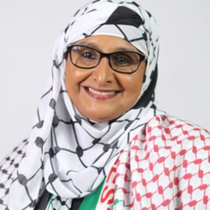South Africa’s long-standing commitment of justice and human rights faces a serious test as MP Saira Abedar of the uMkhonto Wesizwe Party challenged Minister of International Relations and Cooperation, Ronald Lamola, over the country’s continued bilateral agreements with Israel.
Lamola recently told parliament that the South African government has not suspended any bilateral agreements with Israel. This despite growing calls for stronger action in response to the worsening humanitarian crisis in Gaza. He explained that while the agreements are currently under review, the authority to suspend or terminate them ultimately rests with cabinet and parliament.
Lamola’s assertion rejected
But Abedar has rejected Lamola’s response.
Speaking exclusively to Sunday World, she described Lamola’s response as “disappointingly vague and largely procedural. It did not address the urgency or seriousness of the matter. Especially considering the (International Court of Justice) ICJ’s findings.
“The response did not provide sufficient clarity on whether government has meaningfully reviewed these agreements. South Africans deserve a transparent and principled position. Not general statements that avoid the core issue. I do not find the explanation satisfactory,” said Abader. She added that simply stating that cabinet or parliament must decide does not explain why no action has been taken since the ICJ ruling.
“Government cannot champion human rights internationally while maintaining normal economic relations with a state accused of genocide. This continued engagement reflects a troubling contradiction. South Africa cannot speak of justice at the ICJ while preserving business-as-usual relationships with entities linked to the Zionist State of Israel. It undermines our credibility.
Lack of moral consistency
“This approach does not align with our longstanding commitment to justice, human rights, and solidarity with oppressed peoples. Our history obliges us to act with moral consistency,” fumed Abader.
She further emphasised that Parliament should play a more proactive role.
“Oversight requires ensuring that government’s foreign policy and its agreements reflect our constitutional values. Especially where grave human rights violations are concerned.
“Diplomatic efforts are important, but they are not enough on their own. Without economic or political consequences, our actions amount to symbolic solidarity. Real accountability requires concrete measures,” she said.
Abedar argued that Lamola’s response sends a message of inconsistency.
Seeking review on stance
“[It says] that government is willing to speak on the global stage. But it is hesitant to act decisively. For South Africans who stand firmly with Palestine, this is deeply disappointing.
“I will be seeking further clarification from the minister and from cabinet. This includes whether any reviews are underway, what timelines exist for decision-making, and what practical steps South Africa is prepared to take should the Zionist State of Israel continue to violate international law. Transparency is essential, and the Palestinian people deserve more than symbolic support,” said Abader.
In December 2023, South Africa filed a case against Israel at the International Court of Justice (ICJ). It accused it of violating the Genocide Convention through its military actions in Gaza. The ICJ, in its provisional ruling in January 2024, ordered Israel to take all measures within its power to prevent acts of genocide. And to allow humanitarian aid into Gaza. The court stopped short of ordering an immediate ceasefire. But it recognised that Palestinians face a real and imminent risk of genocide.
South Africa has since positioned itself as one of the leading voices globally advocating for Palestinian rights. However, critics including Abedar argue that continuing trade, diplomatic, and cultural ties with Israel contradicts this moral stance. And it weakens South Africa’s credibility as a defender of international justice.



